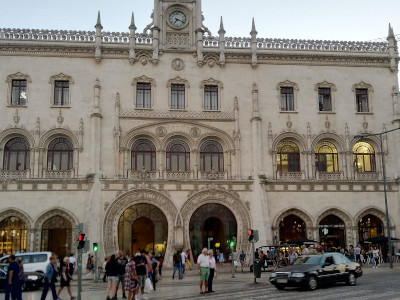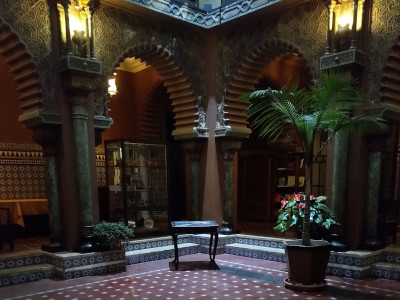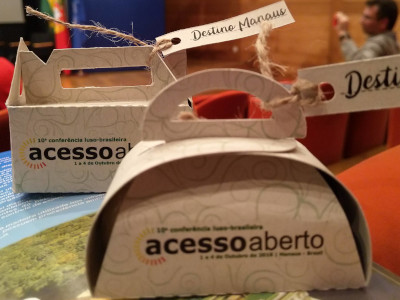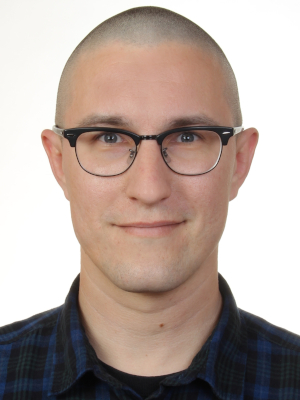9th ConfOA: the Brazil-Portugal Conference on Open Access
Posted on 13 November 2018
9th ConfOA: the Brazil-Portugal Conference on Open Access
 Image courtesy of Raniere Silva
Image courtesy of Raniere SilvaBy Raniere Silva, Software Sustainability Institute, Stephan Druskat, Humboldt-Universität zu Berlin.
ConfOA is the Brazil-Portugal Conference on Open Access and the 9th edition was hosted in Lisbon, Portugal between the 2nd and 4th October 2018. Although the conference only has open access in its name, it is the place to talk about the broader concept of open science with many stakeholders. Stephan Druskat and I had a short presentation about the Citation File Format accepted, so I went to warm Lisbon to spread the word on the importance of software citation.
Beyond journals, articles and versions of record
The conference started with a keynote talk by Jean-Claude Guédon from the Université de Montréal, a long time champion of the open access movement. His keynote included some historical context on the change from societies' "free" peer-review publications to publishers’ expensive journals. In short, international journals and metrics associated with journals are the reason for the rise of publishers, which has made science communication expensive. Jean-Claude also mentioned the common practice, until the 1960s, of translating important papers to be included in societies' publications, a practice that has now vanished.
The conference attracts a very diverse audience, from librarians to computer scientists, and the open keynote helped all attendees to be on the same page for the next two days of fascinating talks and conversations.
Citizen Science
This year, the panel was about citizen science, a term that is used to describe different research workflows—from citizens without a PhD investigating something in their garages in their spare time, to the participation of citizens in research led by universities and other research institutions. The panel was chaired by Sarita Albagli from IBICT and had Paulo Jorge Gama Mota from the University of Coimbra and Maria Inês Alves Vicente from the University of Leiden as panelists.
Members of the panel presented citizen science-related activities they were involved in and inspired attendees to suggest similar activities to other researchers at their home institutions.
 Image courtesy of Raniere Silva
Image courtesy of Raniere SilvaInteroperability
Some presentations at CONFOA were great examples of the importance of interoperable platforms in research, one of the themes of the Software Sustainability Institute’s Collaborations Workshop 2019. Some highlights were:
-
raising awareness of the importance of accessible platforms and portals that deal with FAIR (findable, accessible, interoperable, and reusable) data;
-
examples of web scraping of the Lattes Platform, where Brazilian researchers' CVs are hosted and used by all funding agencies in Brazil, because the platform doesn't offer any form of API;
-
discussions around citation metrics and alternative metrics, usually from social networks, and how the two could be connected.
Citation File Format
We only had five minutes to present the Citation File Format so we decided to have more of a motivational talk instead of a technical one. We reminded attendees, as Jean-Claude said, that citation metrics are used for research evaluation and promotion, that it is important to cite not only articles but also data sets and software, and cite them in ways that do not present data sets and software as second class citizens: Don’t only mention them in the text; instead, add them to the list of references. We also presented attendees with some of the challenges related to citing software, such as determining who the first author is, the version of the software, and others.
We received two comments from the audience. The first one was a personal experience report of one enlightened attendee who already tries to cite the software they use. The second one was related to the fact that software should have a DOI, and not only software but many other research objects can receive one, e.g. via platforms like Zenodo and figshare.
More Activities
The conference also had one-minute presentations for authors of accepted posters. This is a great opportunity, because it helps you getting to know the face of who you need to talk to during the breaks. Some of the lightning talks’ topics that weren't already mentioned in this blog post include institutional repositories and open peer review.
In addition to the scientific programme, attendees had the opportunity to watch three cultural presentations: a choir, Portuguese folk song with dance, and chamber music.
 Image courtesy of Raniere Silva
Image courtesy of Raniere SilvaFinal Words
The 9th edition of ConfOA had a rich scientific programme related to open access in Portuguese-speaking countries, and we are grateful for the opportunity to talk about the Citation File Format for the first time at a non-English-speaking conference. We will continue to develop the Citation File Format infrastructure and perhaps see everyone again next year in Manaus, Brazil for the 10th ConfOA, which will be a very special one.
If you wish to discuss this post with us, send us an email or contact us on Twitter @SoftwareSaved.

